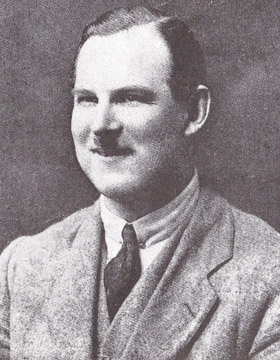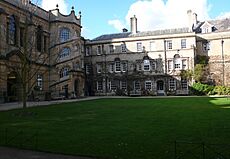C. R. M. F. Cruttwell facts for kids
Quick facts for kids
C. R. M. F. Cruttwell
|
|
|---|---|

Cruttwell in Isis magazine, 1924, next to a funny article by Evelyn Waugh
|
|
| Born |
Charles Robert Mowbray Fraser Cruttwell
23 May 1887 Denton, Norfolk, England
|
| Died | 14 March 1941 (aged 53) Stapleton, Bristol, England
|
| Education | The Queen's College, Oxford |
| Occupation |
|
| Parent(s) |
|
Charles Robert Mowbray Fraser Cruttwell (23 May 1887 – 14 March 1941) was a British historian and university leader. He worked at Hertford College, Oxford, first as a dean and later as its principal.
He was an expert in modern European history. His most famous book was A History of the Great War, 1914–18. However, many people remember him because of a long-running joke by the writer Evelyn Waugh. Waugh used the name "Cruttwell" for silly or unpleasant characters in his early books. This made fun of Cruttwell, who had been Waugh's teacher. This ongoing teasing might have made Cruttwell's health problems worse later in his life.
Cruttwell was a brilliant student at The Queen's College, Oxford. In 1911, he became a Fellow at All Souls College, Oxford. The next year, he started teaching history at Hertford College. His university career was paused when he served in the First World War. He was badly injured during the war.
He returned to Oxford in 1919. He became the dean of Hertford College, then its principal in 1930. The jokes from Evelyn Waugh started when Waugh was a student at Hertford from 1922 to 1924. Waugh continued to make fun of Cruttwell until shortly before Cruttwell passed away.
During his time as principal, Cruttwell wrote his most important books. This included his history of the First World War. He also held various jobs within the university. Outside of work, Cruttwell was a Justice of the Peace in Hampshire. He also tried to become a Member of Parliament for Oxford University in 1935 but did not win. Due to poor health, made worse by his war injuries, he retired from Hertford in 1939. He became very unwell and passed away two years later.
Contents
Early Life and Studies
Family and Childhood
Charles Robert Mowbray Fraser Cruttwell was born on 23 May 1887. He was the oldest of three sons. His family lived in the village of Denton, Norfolk. His father, Rev. Charles Thomas Cruttwell, was a church leader and a scholar of Roman literature. His mother, Annie, was the daughter of Sir John Mowbray, 1st Baronet. Sir John was a politician who served in Parliament for many years.
Young Cruttwell went to Rugby School. In 1906, he won a scholarship to The Queen's College, Oxford. There, he studied classics and history. He did very well, earning top grades in modern history. In 1911, he became a Fellow at All Souls College. A year later, he began teaching history at Hertford College.
Serving in the First World War
When the First World War began in August 1914, Cruttwell joined the army. He became a second lieutenant in the Royal Berkshire Regiment. By 1915, he was fighting in the trenches in France. He led many patrols into dangerous areas and was severely wounded in the leg.
In early 1916, he was declared unfit for active fighting due to ongoing muscle pain and rheumatism. In August 1917, he became an instructor for officer training in Oxford. Later in the war, he worked in the Intelligence Department. He left the army in 1919 and returned to Oxford. In 1922, he wrote a short history of his regiment's actions during the war.
The war had a lasting impact on Cruttwell. It seemed to change his personality. He became more short-tempered and impatient. The writer Evelyn Waugh, who was a student at Hertford in the 1920s, later said that Cruttwell seemed to carry the "muck of the trenches" with him.
Life at Hertford College
When Cruttwell returned to Hertford College, he became a Fellow in modern history. A year later, he was made the college's dean. This meant he was in charge of student discipline. He held this job for five years. He also became involved in running Oxford University. He was elected to its main governing body, the Hebdomadal Council.
Cruttwell was known for being good at administration. In 1930, he was chosen to be the principal of Hertford College. As principal, he helped create the university's geography school. He also made sure the first Oxford professor of geography was based at Hertford.
During his time as principal, he finished his most important academic works. This included his history of the Great War (1934). This book earned him a special degree called DLitt. In 1936, Cruttwell gave a lecture about Britain's strategy in the Great War. That same year, he published a book about the Duke of Wellington. In 1937, he wrote his last major academic book, A History of Peaceful Change in the Modern World.
In 1935, Cruttwell tried to follow his grandfather's path and become a Member of Parliament for the university. He ran as a Conservative candidate in the general election. However, he lost to an independent candidate named A. P. Herbert. This was the first time in many years that a Conservative had not won one of the university's seats. Evelyn Waugh, who disliked Cruttwell, was very happy about this defeat.
Later Years
Cruttwell never married. He once proposed to a woman named Anne Huth-Jackson, but she said no. There are no other stories about him having romantic relationships.
Outside of his university work, he enjoyed spending time at his country house. It was near the village of Highclere in Hampshire. He was active in his local community there. He also served as a Justice of the Peace, which meant he helped with local legal matters.
His health was not good because of his war wounds. He often suffered from rheumatic fever. In 1939, his poor physical condition led him to retire early from Hertford. After this, he struggled with his mental health. This might have been made worse by Evelyn Waugh's continued teasing. He eventually received special care at the Burden Neurological Institute in Stapleton, Bristol. He passed away there on 14 March 1941, at the age of 53.
He left his collection of books and £1,000 to Hertford College. He also left an oil painting of himself, which his cousin Grace Cruttwell painted in 1937.
What People Thought of Him
Cruttwell's professional reputation is often overshadowed by his disagreement with Evelyn Waugh. However, some historians believe the importance of this feud has been overblown. One biographer noted that Cruttwell spent his whole career writing about war because of his own experiences as a soldier.
His book A History of the Great War (1934) is highly regarded. Historian Geoffrey Ellis praised it for its honest opinions about the main people involved in the war. When it was published, the book received a lot of praise. The Naval Review called his description of the Battle of Jutland "admirable." They said the book was "invaluable" for anyone wanting a clear idea of the war's general course. However, the Royal United Services Institute thought the book lacked enough sources. More recently, writer Humphrey Carpenter criticized the book for not showing enough human feeling.
Despite some criticism, historian Llewellyn Woodward called it "the most profound study of any war in modern times." He said it inspired his own history of the Great War. Strategist Colin S. Gray described Cruttwell as "the most balanced of the historians of that conflict."
Reports about Cruttwell's relationships with his colleagues and students are mixed. Waugh's biographer, Selina Hastings, described him as not very attractive, "good-hearted but difficult," and sometimes rude to his male colleagues. Waugh himself described him as "tall, almost loutish, with the face of a petulant baby." However, another student, Christopher Hollis, found nothing unusual about Cruttwell. Some suggest that Cruttwell's difficult manner might have been due to shyness.
There was clearly a mutual dislike between Cruttwell and Waugh. Hastings pointed out that Cruttwell could have expelled Waugh from the college many times but chose not to. Ellis acknowledged Cruttwell's "forceful, forthright and eccentric character." But he also stressed Cruttwell's kindness to close friends and his care for his students.


